The partnership chose to collect some testimonies that could reinforce the message of the Brochure produced in the 2nd Intellectual Output, containing direct messages to the representatives of the migrant communities in Italy, Norway, Greece and Slovenia.
Hearing the direct voice of the persons concerned is always a source of amaze, of astonishment, as we realize that the persons’ lives are complex and sometimes incredible, worth to be deepened. Listening to these voices is the first step towards actions that might bring them support and allow them to be heard.
We included here four testimonies coming from Italy: one of a Tunisian mother taking care of her disabled daughter, a young carer from Morocco, a man from Camerun who became a professional carer and one of a Senegalese couple in which the wife takes care of the husband in the wheelchair.
From Norway we collected the voice of a nurse, highlighting the difficult balance between the hospital’s rules and the “cultural habits” of the migrant patients. Again, it is an invitation to explore more the complexity the “others” bring to our counties and open a dialogue with them.
The testimonies from Greece highlight another important issue for some of the migrant carers: the stigma associated to them as paid carers, and the difficulty to be perceived as a migrant who takes care of his/her own family members, for free.
There are some similarities in the stories: the lack of the support from the relatives in the new country, the relationship with the support services (sometimes positive, sometimes influenced by cultural habits that don’t speak the same language), but also the desires and the dreams of these persons.
Audio stories
Click play to see the video
1: See the English transcription
INTERVIEWER: How many years are you in Greece?
PARTICIPANT: 20 years. I am married to a Greek for the last 32 years and I have 2 daughters.
INTERVIEWER: Did you face discrimination coming to Greece? What is your experience?
PARTICIPANT: I really liked Greece since I was a little kid and I always dreamt of marrying a woman for Greece. Thank God, my wife is Greek from Asia Minor.
And here they are very nice people. Very nice! So, I have never faced (racism).
INTERVIEWER: What is your opinion about the healthcare system?
Have you faced any difficulties with hospitals and doctors?
What difficulties have you faced?
PARTICIPANT: As long as you have all the necessary documents and you are insured, there is no problem. When I came, we had an insurance booklet and the people were nice. The services, I find them excellent! Now, some difficulties, I think are routine problems. Some days it is easy, some days it is difficult. But I think all countries are like that. It's not only Greece. Everywhere is the same.
INTERVIEWER: When you were looking for doctors, was it easy to find someone to respond to you quickly?
PARTICIPANT: As I told you sometimes it is easy, sometimes it is hard. We can find a very good doctor, And now with the doctors’ appointments (referring to a new system in the Greek healthcare), it is very convenient, because you can go to a doctor to get your prescription, a pathologist or whatever and it is only 10 euros. So it is fine, nothing changed. Only that we have to be careful now, thank God everything is ok.
INTERVIEWER: Do you have connections with other people from Egypt who helped you here in Greece?
PARTICIPANT: Is there a community here? An Egyptian community. Well, there are people here with permanent residency, youget it once, twice, three times for 3 or 4 years.
INTERVIEWER: What I am asking is if you have a community from Egypt here.
If you have friends or if you have...
PARTICIPANT: I have friends who come and go, they stay for a year or so. But I also have friends who have their businesses here and they have a lot of work.
INTERVIEWER: Ok, so great! Thank you for your time!
PARTICIPANT: Thank you too! Goodbye!
Stories
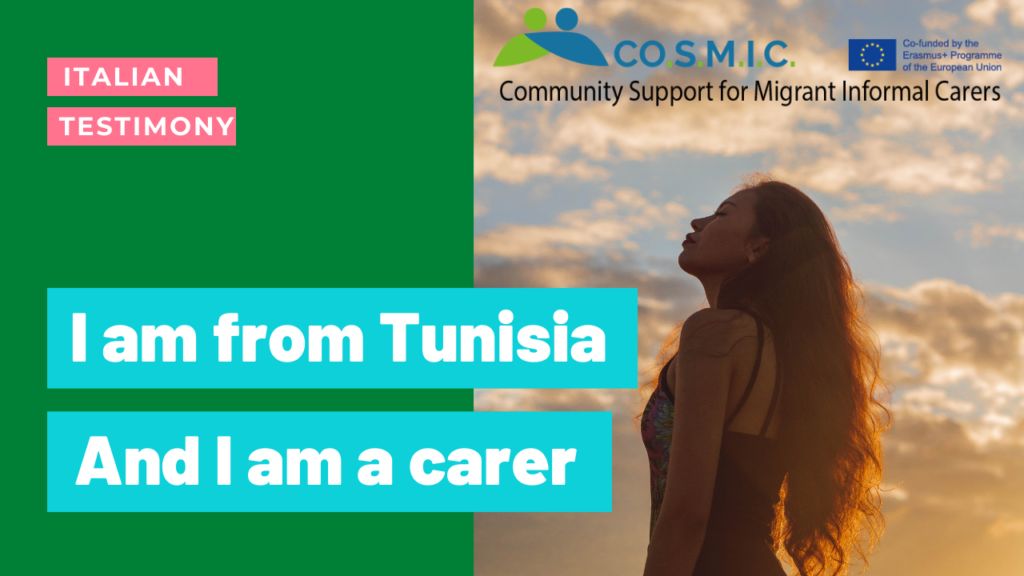
Italian
C. e suo marito si sono sposati in Tunisia nel ’96. A fine 2001 il marito ha deciso di emigrare in Italia, perché voleva migliorare le proprie condizioni di vita e dare un futuro migliore alla famiglia. In Italia è rimasto prima per due anni, e poi nel 2004 C. lo ha raggiunto tramite il ricongiungimento familiare.
In Italia la coppia è da sola con i quattro figli, di cui una gravemente disabile nata in Tunisia. Alla nascita la bambina è stata ricoverata in ospedale per un mese e da quel giorno C. ha iniziato a dover dividersi tra casa –situata presso un piccolo villaggio tunisino- e ospedale -nella città più grande più vicina. Quello è stato un periodo molto duro ma allievato dal sostegno che sua madre riusciva a darle. Arrivata in Italia, la bambina ha subito numerosi ricoveri e interventi chirurgici. Oggi è è sulla sedia a rotelle anche se non è paralizzata, può camminare da sola. Deve fare attenzione perché ha un tubo per l’ossigeno, dal quale può staccarsi per massimo un’ora ed una PEG dalla quale viene alimentata.
“Non ho nessuna rete familiare qui, solo mio marito che quando non lavora mi dà una mano. Come dice il proverbio arabo “si devono mettere le mani nell’acqua fredda” ossia bisogna avere pazienza e affrontare la situazione con lucidità.
Sono molto contenta però del supporto che ricevo dai servizi. Due volte a settimana porto la bambina a scuola per due ore e gli altri giorni, ci sono due educatrici che si alternano per andare a casa (dal lunedì al sabato, 2 ore al giorno). Inoltre, un medico ed un infermiere visitano R. una volta a settimana direttamente a domicilio.
È stato grazie alla scuola che sono venuta a conoscenza dei servizi di cui potevo usufruire, Mi è arrivata una lettera dalla scuola per invitarmi ad iscrivere i figli. Ho spiegato la situazione di R. ed allora la scuola ha attivato i servizi educativi e mi ha aiutata a capire meglio come muovermi sul territorio. La scuola è stato un importante punto di riferimento. Fin dall’inizio siamo stati aiutati, non ci siamo mai sentiti soli… Ma all’inizio è stata dura, abbiamo dovuto imparare tutto
Mi piacerebbe conoscere atri genitori con figli disabili, ma mi troverei meglio con genitori della mia stessa comunità, mi sentirei più a mio agio e non avrei il problema della lingua.
In Italia mi piace il modo con cui gli operatori si relazionano alla bambina, la accarezzano e la fanno sentire amata. Una volta all’anno dall’8 luglio al 9 settembre torniamo in Tunisia e vediamo la differenza. Lì le persone che vedono R. si allontano. I miei figli che sono cresciuti con una sorellina disabile sono diversi. L’educazione che hanno ricevuto in Italia li fa essere inclusivi con gli altri bambini che hanno delle disabilità.”
English
C. and her husband got married in Tunisia in 1996. At the end of 2001, her husband decided to emigrate to Italy, because he wanted to improve his living conditions and give his family a better future. He first stayed in Italy for two years, and then in 2004 C. joined him through family reunification.
In Italy, the couple is alone with their four children, one of whom is seriously disabled and born in Tunisia. At birth, the child was hospitalized for a month and from that day on C. began to divide herself between a house - located in a small Tunisian village - and a hospital - in the nearest larger city. That was a very hard period but relieved by the support her mother was able to give her.
Arrived in Italy, the girl has undergone numerous hospitalizations and surgeries. Today she is in a wheelchair even if she is not paralyzed, she can walk alone. Carers must be careful because she has an oxygen tube, from which she can detach for a maximum of one hour and a PEG from which it is feeded.
“I have no family network here, only my husband who gives me a hand when he's not working. As the Arab proverb says, "you have to put your hands in cold water", that is, you have to be patient and face the situation with clarity. However, I am very happy with the support I receive from the services. Twice a week I take the child to school for two hours and on the other days, there are two educators who take turns to go home (Monday to Saturday, 2 hours a day). In addition, a doctor and a nurse visit R. once a week directly at home. It was thanks to the school that I learned about the services I could use. I received a letter from the school inviting me to enroll my children. I explained R.'s situation and then the school activated the educational services and helped me to better understand how to move around the area. The school was an important point of reference.
From the beginning we were helped, we never felt alone ... But in the beginning, it was hard, we had to learn everything. I would really like to meet other parents with disabled children, but I would be better off with parents from my own community, I would feel more comfortable and I would not have the language barrier. In Italy, I like the way in which professionals relate to the child, caress her and make her feel loved. Once a year from 8 July to 9 September we return to Tunisia and I can see the difference. There, those who see R. move away. My other children, who grew up with a disabled little sister, are different. The education they received in Italy makes them inclusive with other children who have disabilities. "
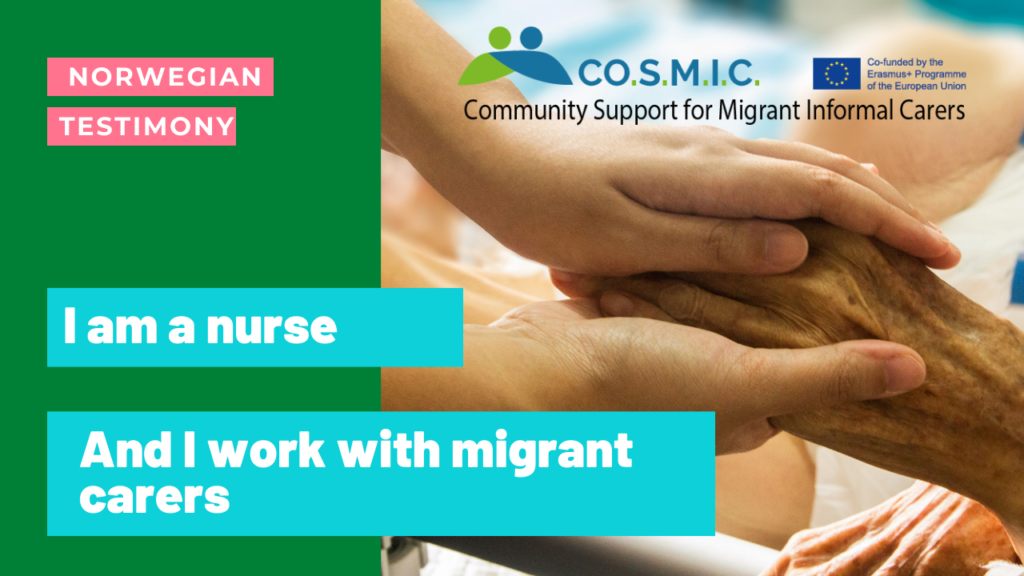
English
Due to confidentiality in relation to work, the person in this interview is anonymous.
As a nurse, we meet both relatives and patients with migrant background. It can be very variable how big challenges one encounters considering how much help the patient needs. Some of the challenges we often deal with is language and cultural differences but also here it is also variable in how much the patient understands him/her self. Is it just under the doctor visits we need someone to translate or do we need one at all time?
¨it has happened that we use the relatives /caregivers as an interpreter, they are often easier to contact (call) than our own translators.¨
Using an interpreter or using relatives as an interpreter is not necessarily the biggest and most demanding challenge you can face. Cultural differences have presented problems with regard to care of the patient after death.
¨It has happened that up to 16 people have entered the patient's room in the event of death. Of course, one should respect the grief and their grief process but it has happened that this has effected other patients and the job one has to perform in relation to a death. This has also been a slightly more demanding problem now during the pandemic, because there is not always an understanding of hospitals restrictions
Another challenge we have encountered in relation to culture is the relative's need to be with the patient around the clock. Of course, there is nothing wrong with that, but in a hospital there are certain rules you have to abide by, but you try to adapt to the patient's and the relatives' needs as best you can.
Norvegian
På grunn av taushetsplikt i forhold til jobb, er personen i dette intervjuet anonym.
Som sykepleier møter vi både pårørende og pasienter med migrantbakgrunn. Det kan være veldig varierende hvor store utfordringer man møter med tanke på hvor pleietrengende pasientene er. Noen av utfordringene vi møter omhandler ofte, språk og kulturforskjeller. Her er det også ganske varierende i hvor stor grad man trenger til alle døgnets tider eller om det kun er ved legevisitt man har behovet for tolk.
¨Det har hendt seg at jeg har ringt pårørende for å bruke de som tolk, fordi man ikke har tolk på avdelingen til det tidspunktet man trenger.
Det å bruke tolk eller bruke pårørende som tolk er ikke nødvendigvis den største og mest krevende utfordringen man møter. Kulturforskjeller har bydd på problemer med tanke på stell etter dødsfall
¨Det har hendt seg at det har kommet opp til 16 personer inn på rommet til pasienten ved dødsfall. Selvfølgelig skal man respektere sorgen og deres sorgprosess men det har hendt seg at dette har gått utover andre pasienter og jobben man må utføre i forhold til et dødsfall. Dette har også vært et litt mer krevende problem nå under pandemien, fordi det er ikke alltid et er forståelse for smittevern.¨
En annen utfordring vi har møtt på i forhold til kultur er den pårørendes behov for å være med pasienten døgnet rundt. Det er selvfølgelig ikke noe galt med det men på et sykehus så er det visse regler man må forholde seg til men man prøver å tilrettelegge for pasientens og de pårørendes behov så godt det lar seg gjøre.
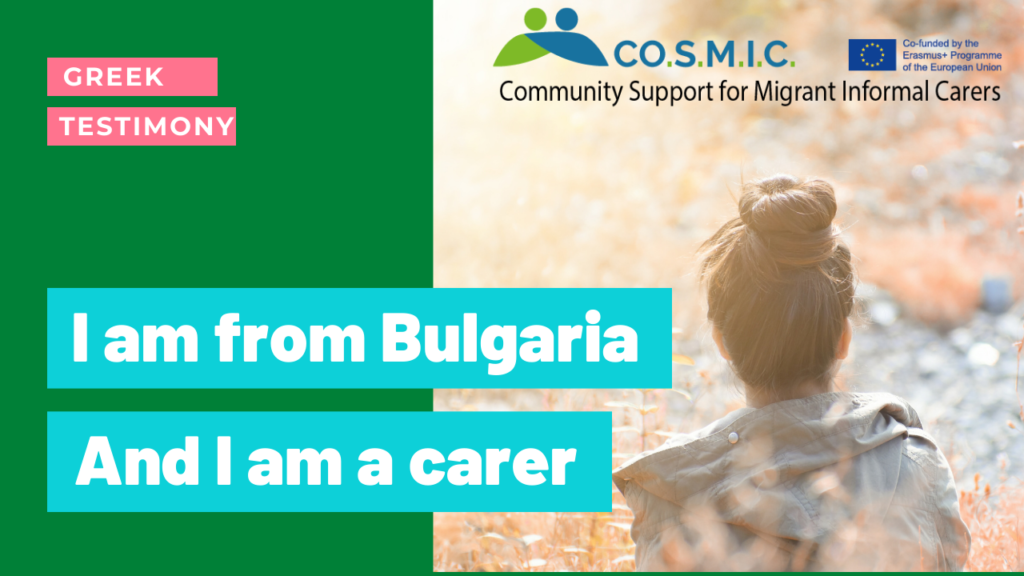
English
I live in Greece since I was a child. I came here with my parents. Ten years ago I had to care for my mother, who is not alive anymore. The health system has some difficulties but I am used to them and managed. But, I had a bad experience during this time: One night I had to go to the hospital to stay with my mother. When I arrived, the security guard stopped me and told me that only family members of patients are allowed in. I explained that my mother is a patient in this hospital. Then he started laughing and said I was lying, because it is obvious I am from Bulgaria (it is common for people from Bulgaria, especially women, to work as informal carer to the elderly). In order to let me in, he had to double check I was telling the truth. It was a very bad experience.
Bulgarian
Ζω στην Ελλάδα από πολύ μικρή ηλικία. Είχα έρθει εδώ με τους γονείς μου. Πριν από περίπου 10 χρόνια έπρεπε να φροντίσω τη μητέρα μου, η οποία πλέον δεν ζει. Το σύστημα υγείας αν και έχει κάποιες δυσκολίες το ξέρω και το διαχειριστήκαμε. Μια άσχημη όμως εμπειρία μου είναι η εξής: Ένα βράδυ έπρεπε να πάω στο νοσοκομείο να μείνω με τη μητέρα μου. Όταν πήγα στην είσοδο με σταμάτησε ο φρουρός, λέγοντας μου ότι επιτρέπονται μόνο οι συγγενείς των ασθενών. Του εξήγησα ότι νοσηλεύεται η μητέρα μου. Τότε γελώντας μου είπε ότι λέω ψέματα και να φύγω αμέσως, αφού φαίνεται ότι είμαι από τη Βουλγαρία (πολλά άτομα από Βουλγαρία, κυρίως γυναίκες, εργάζονται χωρίς ένσημα και προσέχουν ηλικιωμένους). Για να με αφήσει να μπω, έπρεπε πρώτα να ελέγξει ότι λέω την αλήθεια. Ήταν μια άσχημη εμπειρία.
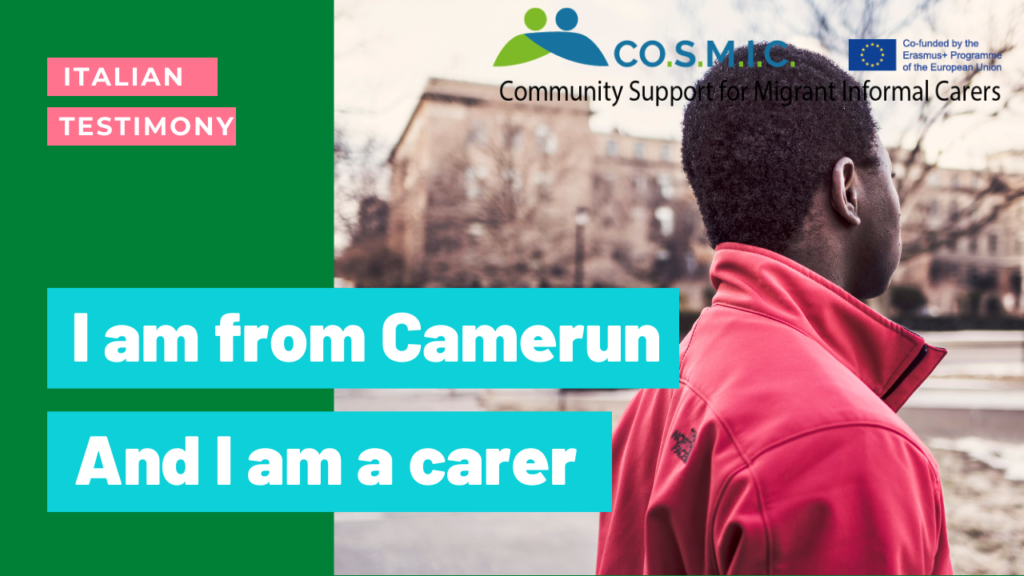
Open the accordion below to read the story
English
TAKING CARE AS VOCATION, BUT ALSO AS PROFESSION
The story of an informal caregiver who transformed his passion into a job
Olivier is a young man who was born and grew up in Cameroun, then he arrived in Italy in 2017. After a difficult migratory pathway, which made him cross numerous countries from Sub-Saharan and Mediterranean Africa, he enters the Italian system of the Extraordinary Receiving Centres (CAS in Italian) for applicants for international protection. He is hosted in a structure from the Province of Ravenna, in the west of Italy.
When he arrives in Italy, Olivier is an educated man, as he completed the secondary school cycle in Cameroon, he is fluent in English, French and around ten local languages (symbol of the particular ethnical composition of Cameroun). He immediately understands the importance of learning Italian ad a means of integration and knowledge of the new context around him. He decides then to learn Italian by himself, through internet, but he also takes the lessons proposed by the hosting structure. These courses allow him to get out of the structure and get in contact with volunteering experiences on the territory. The quality of his Italian improves quickly.
His personal characteristics make him become a point of reference both for the other hosted persons and for the professional staff itself. More he gets included into the Italian society, more his role of a simple translator and interpreter becomes one of an intercultural mediator.
Following his own vocation of helping the others, Olivier accepts with enthusiasm to refer to the staff of the centre the impressions of the other hosted persons, overcoming the linguistic barrier, and also to accompany them during the medical exams, in order to help with the health issues. In these moments, Olivier realizes, little by little, that he gains the competences needed to become a professional caregiver, he understand the potential of this opportunity.
Everybody around him is enthusiastic about the work Olivier is available to do. He is able to refer to the doctors clear details on the symptoms, he is able to supervise the correct use of the medicines by the other migrants form the centre, who sometimes have a low education level: Therefore he gets an informal recognition of his role.
The dangers and the hardships the hosted persons had to experience are the same as Olivier’s. The group of persons with which he divides the accommodation becomes his family. He takes care of them, and especially of the new comers.
I Olivier notices and remembers everything around him: he collaborates more and more often with the sanitary services from the territory; he gets used to the medical and healthcare staff ; he has a deeper knowledge of the Italian national healthcare system; he acquires a specialized vocabulary.
Meanwhile, his request for international protection goes on. After a redress to the Court, he obtains the right to a stay permit of two years. Olivier is very happy for this decision of the Court.
He now has to leave the Reception centre and he starts to have all kinds of jobs, especially in the tourism sector, in order to earn the money for a course as Intermediate Care Technician (OSS in Italian). With a lot of willpower, Olivier succeeds in finishing the course and he obtains the professional qualification.
His professional profile is highly requested on the market, therefore he finds a job in the outskirts of Bologna, in the healthcare sector, as Intermediate Care Technician, by a residence for elderly persons partly autonomous.
Nowadays the life of Olivier goes on. Knowing to know himself it meant, for him, the key to a new life.
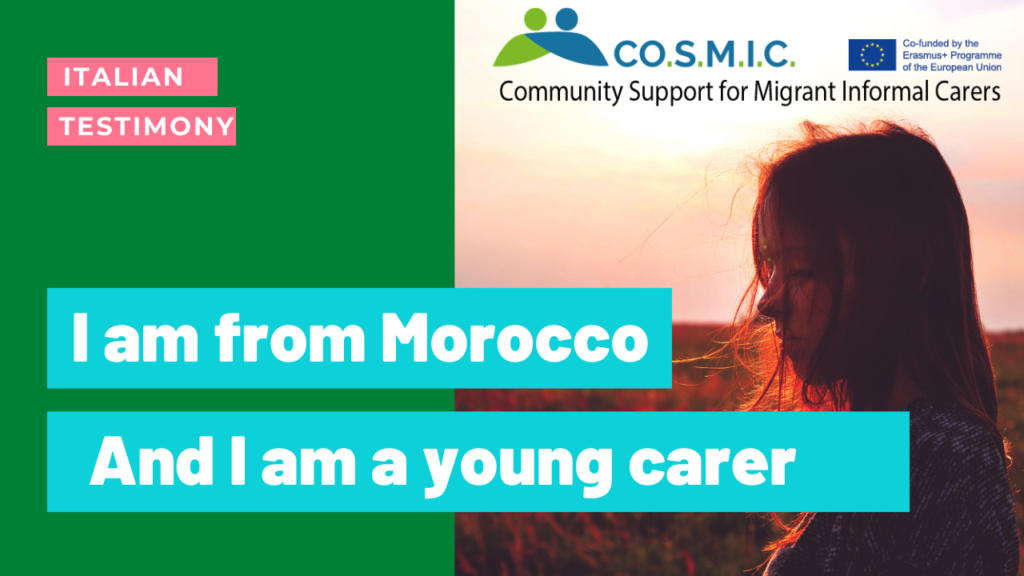
Open the accordion below to read the story
English
THE STORY OF KAHWALA
Kahwala is 14 years old and comes from Morocco. She left her country in 2017 together with her family: her father Mohamed, her mother Habiba and her two brothers, Ilyas and Imrane.
The family is original from Ouarzazate, in the South of Morocco, but they get transferred to Meknes in search of better living conditions. Her father, Mohamed, is an interior decorator, while the mother is a housewife. The difficulties they have to face make them migrate to Libya, where they find harder living conditions compared to the ones at home. Mohamed is diagnosed with a form of diabetes B type.
The family migrates to Italy, where it’s inserted into an accommodation dedicated to disadvantaged persons. None of the family members speaks Italian or French. Kahwla goes to school, where she socializes with her Italian schoolmates and, thanks to her commitment, she learns the language soon.
In March 2019 Rayan is born: the family becomes bigger. During the same period Habiba discovers she has the same form of diabetes like her husband. The family is accompanied by professionals from the centre which hosts it, and they take care of the parents’ health and of the new-born baby. The medical examinations become more and more frequent and important. Kahwala’s propension makes her become a reference point for all her family and for the professionals around, in spite of her age. She explains to her family the medical prophylaxis, the more complicated terminology, and she becomes familiar with the sanitary services. She also accompanies the mother and the professionals of the centre during the paediatric visits for the younger brothers, guaranteeing an important support for the communication and the understanding of the different situations.
In spite of her young age, Kahwala represents a reference person for the healthcare of all her family members, managing to mingle well the education pathway with the assistance to her parents and brothers. Thanks to her, also Ilyas and Imrane start a significant integration process through the linguistic knowledge and competences Kahwala offers them every day.
The disease of the parents is under strict observation, and the close collaboration between the professionals and Kahwala brings to the progressive autonomy of the father and of the mother, overcoming also the reluctance due to their cultural background.
Kahwala’s involvement into the mediation, information and care pathways allowed the whole family to have a normal life, in spite of the severe health problems and initial integration difficulties.
In July 2020 a new sister is born: Asia.
Kahwala feels proud of her own family and of her own role. She realizes that her complicated life story made her stronger, and she is determined in making the best out of what life has taught her. Nowadays she is finishing the school pathway and she wants to make a course for Intermediate Care Technician or try to pass the exam to the Faculty of Medicine. Nobody knows how her future will be, but Kahwala can try to make her dreams come true.
